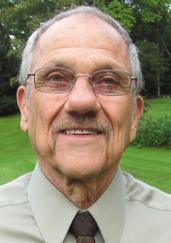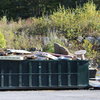2017 Berne election: James Cooke for council
BERNE — James Cooke said he is running to stay a councilman because he wants to serve the townspeople of Berne.
A Democrat, Cooke is running on the Democratic line. This will be his first election, but Cooke has already been serving for the past eight months; the board appointed him after Councilman Wayne Emory resigned on Jan. 31.
Cooke, 70, who grew up in Albany, has lived in Berne for 36 years with his wife Diane; they have run an antiques business together for the last 32 years. He served in the United States Army in the Vietnam War from 1967 to 1968, and after this enrolled in courses at the University at Albany.
He later decided it wasn’t for him, and studied computer programming at a small school where he learned programs such as Fortran and Cobalt. He ended up repairing circuit boards, he told The Enterprise in February following his appointment.
In Berne, Cooke volunteered as a committee member on the town’s master plan committee, and assisted in creating the 1992 Comprehensive Land-Use Plan, as Cooke explained in a recent letter to the Enterprise editor. Cooke also served for a little under four years as chairman on the committee that produced the 2011 Town of Berne Proposed Comprehensive Plan.
Cooke is a member of the town’s Democratic Committee, and told The Enterprise in February that a discussion at one of the meetings of the resignation of Emory, also a Democrat, led to the suggestion that Cooke be appointed. At the time of his appointment, he had said he was not yet sure if he would run for office, but told The Enterprise on Monday that he had been asked to continue serving, and wanted to serve the townspeople.
On shared services, Cooke said, “Personally, I think it’s the way of the future.”
Items such as shared health insurance, purchasing power, and maintenance facilities could save money, he said. Shared staff in the highway departments, which had been discussed but not included in the county-wide shared-services plan, had caused many in town to be concerned about shared services.
“That’s where a lot of friction comes in,” Cooke said.
He added, however, that consolidation of the departments could be beneficial, if it is found to be more efficient and cost-effective for the town.
“People should give it a good consideration, at the very least,” he said.
Regarding autonomy of the highway garage, Cooke said that the state’s Town Law dictates which department has jurisdiction over what.
He added that he didn’t find conflicts over items such as the installation of a biometric time-punch machine and cameras at the highway garage to be of much concern.
“I think there’s better things to put our efforts to,” he said.
He said attitudes about the four 10-hour-day work week for highway employees seems to be split 50-50, but that that was allowed in the current contract. Cooke said he didn’t have an issue so long as work is being completed.
Looking at looming concerns of the City of Albany Landfill closing, Cooke recalled growing up in Albany and observing a nearby dump on Hoffman Avenue, where items were burned, as well as watching the landfill on Washington Avenue grow over time.
“This is a huge, world issue; this is a state issue,” he said. “This is bigger than the town.”
Cooke said it would be necessary to encourage recycling in the town, and take extra steps to sort out items from the waste stream.
“The accumulation of the garbage that the people produce is a huge problem,” he said.
He noted that the town could also use waste-to-energy facilities that burn items. Although the facilities need a large amount of waste to produce energy, Cooke said the town could use other energy sources when the facility did not produce enough.
“The answers to these things is way above the town level … ,” he stressed. “We can only work with what we are provided.”
Cooke concluded that municipalities and residents would both have to do their best to recycle properly and be more conscientious of where waste goes, while the state and federal governments should also “stop passing the buck.”
Regarding insurance, Cooke said that the definition of a domestic partner is fairly broad. He said that this could be made more specific and make the issue easier to address.
“I see no reason to not cover the other partner,” he said, of insurance for town employees.
He added, however, that insurance can be “unreasonably expensive,” and noted that the consolidation of insurance between Albany County and the town could resolve the issue by offering better rates, although he acknowledged that legislation would have to be changed to do so.
“Those two gentlemen are my neighbors and my friends,” said Cooke, of the fired town employee, Scott Green, and his partner, Tim Lippert, who works part-time for Berne.
Regarding the tax cap, Cooke said that he would have to look into the issue further.
“It’s a little bit more complicated once you start peeling the layers away,” he said.
He added that staying under the levy limit currently is not an issue, as the proposed 2018 budget offers about a 4-percent tax decrease.
Cooke said that Berne is currently looking into agricultural tourism and is collaborating with other towns to help businesses and agriculture grow in the area.
“There are a lot of people that think we should do more,” he said. “And I do, too.”
Cooke recalled working on the town’s comprehensive plan, and how it does not allow for large businesses in Berne.
“We certainly can encourage small business,” he said. “We certainly can encourage home-based businesses.”
Cooke said that small businesses and home businesses should be considered when changing the zoning code, and that the town should consider businesses that fit with the community and environment, including what the public wants.
He said that, if he is elected, he will suggest that one board member keep track of county and regional programs that could help small businesses in Berne.
Cooke concluded that, if he is elected, he will do his best to address these issues.



